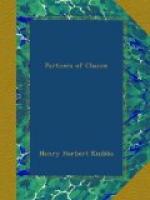“Why, sure! And while the House is in session, I might rise to remark that I can’t help bein’ called ‘Senator,’ because I’m guilty. But, honest, I always feel kinder toward my fellow-bein’s who call me just plain ‘Steve.’”
“All right. I’ll take your word for it.”
“Don’t you take my word for anything. How do you know but I might be tryin’ to sell you a gold mine?”
“I think the risk would be about even,” said Bartley.
The Senator chuckled. “I just heard Wishful lopin’ down the hall with his bathin’ outfit, so I guess the right of way is clear again. And there goes the triangle—sounds like the old ranch, that triangle. You see, Wishful used to be a cow-hand, and lots of cow-hands stop at this hotel when they’re in town. That triangle sounds like home to ’em. I’m stoppin’ here myself. But I got a real bathroom out to the ranch. Let’s go down and look at some beef on the plate.”
CHAPTER V
“Top hand once”
Bartley happened to be alone on the veranda of the Antelope House that evening. Senator Brown and his “missus” had departed for their ranch. Mrs. Senator Brown had been a bit diffident when first meeting Bartley, but he soon put her at her ease with some amusing stories of Eastern experiences. The dinner concluded with an invitation from Mrs. Brown that anticipated Bartley visiting the ranch and staying as long as he wished. The day following the Senator’s departure Bartley received a telegram from his friend in California, wishing him good luck and a pleasant journey in the Arizona country. The friend would see to Bartley’s baggage, as Bartley had forwarded the claim checks in his letter.
The town was quiet and the stars were serenely brilliant. The dusty, rutted road past the hotel, dim gray in the starlight, muffled the tread of an occasional Navajo pony passing in the faint glow of light from the doorway. Bartley was content with things as he found them, just then. But he knew that he would eventually go away from there—from the untidy town, the railroad, the string of box-cars on the siding, and seek the new, the unexpected, an experience to be had only by kicking loose from convention and stepping out for himself. He thought of writing a Western story. He realized that all he knew of the West was from hearsay, and a brief contact with actual Westerners. He would do better to go out in the fenceless land and live a story, and then write it. And better still, he would let chance decide where and when he would go.
His first intimation that chance was in his vicinity was the distant, faint cadence of a song that floated over the night-black mesa from the north. Presently he heard the soft, muffled tread of horses and a distinct word or two of the song. He leaned forward, interested, amused, alert. The voice was a big voice, mellowed by distance. There was a take-it-or-leave-it swing to the melody that suggested the singer’s absolute oblivion to anything but the joy of singing. Again the plod, plod of the horses, and then:




